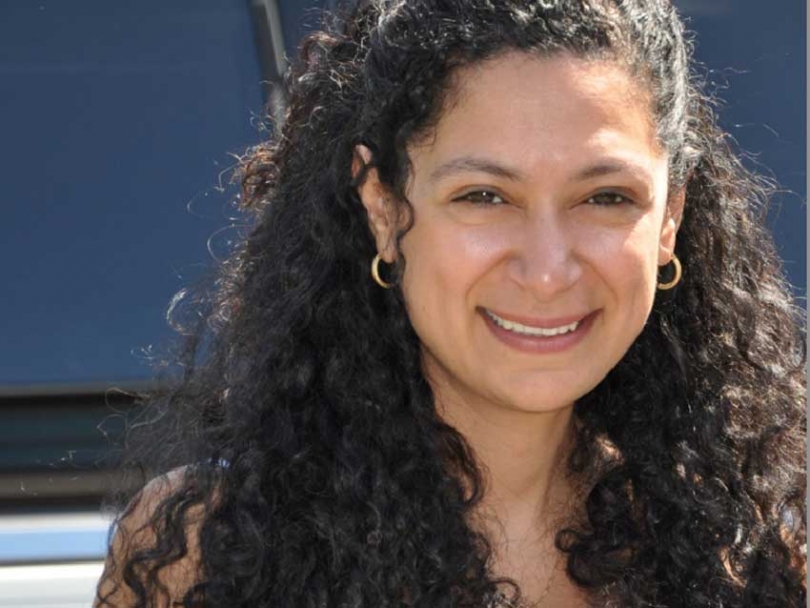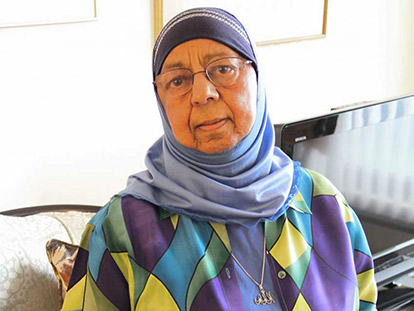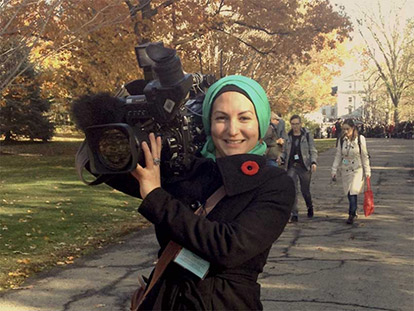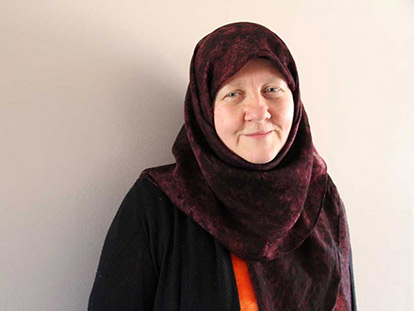 Hoda Elatawi is an Ottawa-based Egyptian Canadian filmmaker.
Courtesy of Hoda Elatawi
Hoda Elatawi is an Ottawa-based Egyptian Canadian filmmaker.
Courtesy of Hoda Elatawi
Dec
If you could sum up Hoda Elatawi in one word, it would most likely be ‘storyteller.’ From a young age, Elatawi loved the art of storytelling, and would turn many of her school assignments into plays, fashion shows, or some other form of artwork.
“It didn’t matter what the subject was, if I could find a way of telling a story visually, I would find it,” says Elatawi.
After immigrating to Canada from Egypt in the late ‘60s, she settled with her family in the Ottawa area. She graduated from the Journalism program (with a minor in Political Sciences) at Carleton University in 1984, and is now married with two grown sons. Elatawi credits her family for sparking her interest in journalism.
“My dad was always really into the news and politics and that kind of drew me in. It was a great opportunity to have discussions, and it was kind of a meeting of the minds, if you will,” she shares.
Drawn to visual and broadcast media, Elatawi did not originally plan to delve into production, thinking she would work in more traditional media. Like many journalism grads, she was attracted to the romanticized image of a foreign correspondent, traversing the world to cover topics on a global scale. After finishing university, Elatawi returned to Egypt and worked for several years in the state media division. At that time, state-run television and radio was very limited, with only a handful of channels in both mediums.
“It was run and controlled by the government, so for all intents and purposes, I worked for the government,” says Elatawi. “It was very bureaucratic. And because I was young and a new graduate, really what I noticed was there wasn’t a lot of choice in terms of how people could consume content back then (in the mid to late 1980s). I moved from there to advertising, which was storytelling in 30 or 60 seconds. That was a very fun, interesting, and amazing world to be in. But what I learned was that I actually wanted more; I wanted the opportunity to tell stories in a longer format.”
That opportunity soon came a-knocking. While she was still in Egypt, she was contacted by a former professor who was working on training materials for different government departments, developing orientation videos for young peacekeepers who were going to be posted in the Middle East. He asked if she would be interested in working with a crew that he would send over to scout locations for the video they were creating for the Department of National Defence. Elatawi did not have to be asked twice and quickly jumped at the chance. That move was what began a shift in her career plans. When she returned to Canada, Elatawi was offered a position at his production company.
“It was an incredible opportunity to be given, and an incredible amount of trust for someone who was as green as I was, because I really did not know what producing entailed at all, and I really learned at the knees of some very experienced freelancers whom I had the privilege to be working with,” says Elatawi. “It was rough going but I also had a lot of support and I’m not sure that people get those kinds of opportunities very often in their lifetime.” She stayed there for a few years, handling the various tasks on the production side of the company before moving on to freelance work, and then settling in to her current place of employment at GAPC Entertainment.
Elatawi has been working as a producer now for almost 30 years, half of which she has spent at GAPC Entertainment. GAPC opened up an entertainment division nearly 20 years ago, and was originally run by Marcel Clément. Clément wanted someone to come work with him in that department to develop both the division and content, and approached the head of the parent company, Ken Stewart, who is also Elatawi’s significant other. Clément specifically requested for her to be brought in, and it was in this way that Elatawi was hired to work at the company her husband ran.
In 2002 Clément decided to retire, leaving the position open for Elatawi to step in. She initially thought the move would be a temporary one, and that another staff member would be brought in for that role.
“Ken told me just hang on, you kind of run things till we find somebody, and here we are some 15 years later. I’m not going to say I’m still waiting,” she says with a laugh, “but that’s kind of how (it happened)…I basically run the entertainment division of the company.”
So what exactly does being a producer entail? It starts with brainstorming and collaborating on ideas that are considered interesting, relevant, or engaging—and most essentially, ones that a broadcaster can see an audience for. The brainstorming phase is one of Elatawi’s favourite stages, because “you’re really blue-skying at that point—anything is possible.” It’s a tough business, as coming up with what seems like a fantastic idea is not a guarantee that it will enter the production stage—a broadcaster can shoot it down if they do not think it will hook enough viewers.
Once an idea has been approved, the process has just begun. From there, producers work with a variety of funders to put together financial applications, as well as with writers to develop the concept into a treatment, and then into a script. After that they work very closely with the writers and play a hand in script editing and story editing. In the final stages, they work with the director and editors in audio and video departments to ensure the show has the right look and feel to it.
“Every step of production, I get to have some involvement in and I get to flex my creative muscles and grow them,” she explains.
Whereas a singular filmmaker may spend years developing and self-financing a film with a topic they are passionate about, whether or not it will appeal to a broad audience, an entertainment company doesn’t have the same artistic luxury.
“Working for a production company like ours is also a business. We have to make sure we’re developing content that we feel really strongly that we can sell,” says Elatawi.
Balancing a personal life with the busy schedule of a producer is no easy task, and is a challenge that Elatawi still has to work hard at to power through.
“It’s a juggle because in our business probably like many other businesses, there are lots of ups and downs. There are times when we are really completely busy, can barely breathe, and then there’s other times where we’re focusing on developing new content, and that’s all speculative, you’re not really getting paid to do that. So you’re investing time, and you’re taking some risks (…) When I’m in production, I’m in production full on. You’re working 12, 14, 16-hour days, you’re exhausted by the end of the day and that doesn’t leave much room for doing all the things you want to do on the personal side,” shares Elatawi.
“I’ve been fortunate that my partner can kind of step in and take care of what’s needed on the home and personal front. And because we’re both working in the same business, I think we’ve managed to do that very well, because we get it. He gets when I’m in production, and vice versa. But it’s not easy…it’s a balance, (and) learning to take care of yourself, boy, I mean, it took me a while to figure that one out, you just have to do it. So it’s a balance, probably like it is for everyone else. Life is very busy and it’s pretty fast, isn’t it?”
But the job is not all gruelling work schedules and stressing about time management. The upside of being involved in every step of the production process is that it gives producers the chance to become more immersed in their subject matter than one might assume.
“I think the thing I love the most is every time I work on a new production or develop a new concept, it’s like going back to school and learning a whole new subject,” says Elatawi. For TV projects such as The Prime Radicals and MathXplosion, Elatawi talks about diving into elementary-level mathematics, as well as strategies on how to teach and inspire a young audience.
“Obviously there’s a lot of things that are similar in terms of the production process, but the content is the thing for me that’s so exciting because it’s fresh and new every time. And the people that I get to collaborate with—well who gets to do that?” exclaims Elatawi.
Her advice for those hoping to have a successful career in multimedia is first and foremost to have a desire for storytelling, and the ability to understand and work within all platforms. Elatawi also stresses the importance of having good communication skills, as opposed to solely focusing on the technical side of the field.
“Understanding the power of social media and building an audience and a community is critical, whether you’re a journalist or in production,” says Elatawi.
Another thing potential filmmakers may not realize is how long the process can often be from conception of an idea to the finished product. For Elatawi’s Muneeza in the Middle, a documentary depicting a Muslim woman’s search for identity, it took six years to complete.
“The more I filmed, the more I realized I really needed to give it a trajectory over time in order to give it that feel of taking a journey with someone. It was kind of an evolution, I think if I’d (thought) when I first started with this that it would be a six year journey, that would have scared me off,” laughs Elatawi.
But the time investment paid off, as the film had three public screenings and garnered a slew of press coverage, not to mention quite a few awards.
“I think what people really liked about the film is they found it relatable, and they walked in not expecting to find it relatable at all. It was revelatory but it was relatable, and that was one of the things I was hoping to accomplish with the film and I think we did that,” says Elatawi.
Elatawi’s latest project is a new film, with the working title of So you want to be a Muslim?
“That film is going to be exploring the different reasons people convert to Islam, other than what I think many people assume, which is radicalization. I think that when we hear in the West of someone converting to Islam, I think there’s a (certain) degree of alarm as it relates to the kinds of things that we’re seeing in the media. But of course when people convert from one faith to another, be it Islam or Judaism or Christianity more often than not—and I would say 99.9 per cent of the time—people are converting for reasons that have to do with…whether it’s a crisis in your life, or spiritual search, or love…people are not typically converting to become radicals or scary people that are violent.”
She is currently in the research phase of developing the film for the CBC.
For more information on Elatawi’s work, visit here
This article was produced exclusively for Muslim Link and should not be copied without prior permission from the site. For permission, please write to info@muslimlink.ca.















